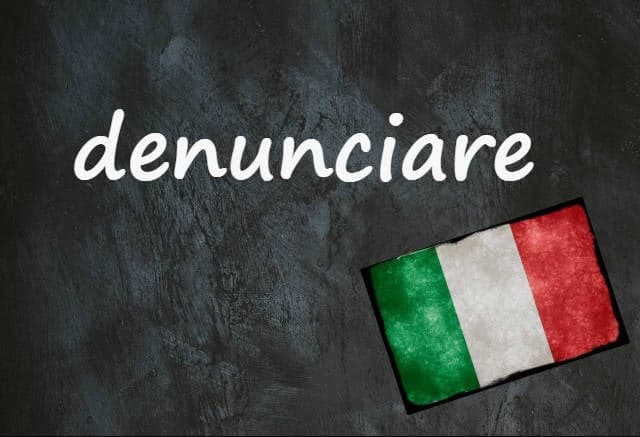
Italian word of the day: 'Denunciare'

Right now, you might be hearing variations of this word used in a lot of Italian news reports about rule-breakers. So what does it mean exactly?
Let's start with the infinitive. Denunciare means 'to report' or 'to declare', and not only bad things: you can report your income to the taxman, for instance, or a birth to the registry office.
Per i residenti in Italia, è obbligatorio denunciare i redditi esteri.
Residents in Italy must declare their overseas income.
La legge italiana prevede l'obbligo di denunciare la nascita di ogni bambino.
Italian law requires you to register the birth of every child.
But it's also the verb to use when you're reporting bad news, like a crime.
Vorrei denunciare un furto.
I'd like to report a theft.
If you can report a crime, you can also report a criminal.
Un altro dipendente lo ha denunciato alla polizia.
Another employee reported him to the police.
And that's where "ti denuncio" (or for multiple people, "vi denuncio") comes in.
"Ti denuncio!"
You might have heard this phrase bandied around in Italy: by a pedestrian fuming at a driver who runs a red light, for instance, or a furious diner who thinks the waiter's just ripped them off.
It means 'I'll report you!' and in Italy, it's the verbal equivalent of shaking your fist at someone.

Reporting someone to the authorities is a threat Italians make a lot, whether it's to call the carabinieri, start a lawsuit, demand a tax audit, summon health and safety officers or something more abstract.
Se torni, ti denuncio per sconfinamento.
If you come back, I'll report you for trespassing.
Ma io vi denuncio, denuncio tutti!
I'll report/sue/press charges against you all!
We'd love to know how many of those threats ever get followed through, because denunciare typically seems to be something you say you'll do rather than actually, you know, doing.

It's worth noting that denunciare has a more figurative sense of bringing something to light, like 'to expose'. So perhaps when you threaten someone with "ti denuncio", perhaps what you're implying is simply that you'll reveal them for the rogue they are.
Ha denunciato la corruzione all'interno del partito.
She exposed the corruption within the party.
Il giornale ha denunciato lo scandalo.
The newspaper exposed the scandal.
You'll notice there's one definition we haven't given: the one denunciare sounds most like, 'to denounce'.
While the two come from the same root – the Latin nuntius, or 'messenger' – the English and Italian versions aren't used in quite the same way. In English it's relatively rare to 'denounce someone' (i.e. inform on them to the authorities), while the more common usage of 'denouncing something' (i.e. criticizing it) is better rendered in Italian by the verbs criticare or condannare.
In other words, when you hear denunciare from an Italian, they're not just disapproving – they're calling the cops. Or at least, they're saying they are.
Do you have a favourite Italian word you'd like us to feature? If so, please email us with your suggestion.
Comments
See Also
Let's start with the infinitive. Denunciare means 'to report' or 'to declare', and not only bad things: you can report your income to the taxman, for instance, or a birth to the registry office.
Per i residenti in Italia, è obbligatorio denunciare i redditi esteri.
Residents in Italy must declare their overseas income.
La legge italiana prevede l'obbligo di denunciare la nascita di ogni bambino.
Italian law requires you to register the birth of every child.
But it's also the verb to use when you're reporting bad news, like a crime.
Vorrei denunciare un furto.
I'd like to report a theft.
If you can report a crime, you can also report a criminal.
Un altro dipendente lo ha denunciato alla polizia.
Another employee reported him to the police.
And that's where "ti denuncio" (or for multiple people, "vi denuncio") comes in.
"Ti denuncio!"
You might have heard this phrase bandied around in Italy: by a pedestrian fuming at a driver who runs a red light, for instance, or a furious diner who thinks the waiter's just ripped them off.
It means 'I'll report you!' and in Italy, it's the verbal equivalent of shaking your fist at someone.

Reporting someone to the authorities is a threat Italians make a lot, whether it's to call the carabinieri, start a lawsuit, demand a tax audit, summon health and safety officers or something more abstract.
Se torni, ti denuncio per sconfinamento.
If you come back, I'll report you for trespassing.
Ma io vi denuncio, denuncio tutti!
I'll report/sue/press charges against you all!
We'd love to know how many of those threats ever get followed through, because denunciare typically seems to be something you say you'll do rather than actually, you know, doing.

It's worth noting that denunciare has a more figurative sense of bringing something to light, like 'to expose'. So perhaps when you threaten someone with "ti denuncio", perhaps what you're implying is simply that you'll reveal them for the rogue they are.
Ha denunciato la corruzione all'interno del partito.
She exposed the corruption within the party.
Il giornale ha denunciato lo scandalo.
The newspaper exposed the scandal.
You'll notice there's one definition we haven't given: the one denunciare sounds most like, 'to denounce'.
While the two come from the same root – the Latin nuntius, or 'messenger' – the English and Italian versions aren't used in quite the same way. In English it's relatively rare to 'denounce someone' (i.e. inform on them to the authorities), while the more common usage of 'denouncing something' (i.e. criticizing it) is better rendered in Italian by the verbs criticare or condannare.
In other words, when you hear denunciare from an Italian, they're not just disapproving – they're calling the cops. Or at least, they're saying they are.
Do you have a favourite Italian word you'd like us to feature? If so, please email us with your suggestion.
Join the conversation in our comments section below. Share your own views and experience and if you have a question or suggestion for our journalists then email us at [email protected].
Please keep comments civil, constructive and on topic – and make sure to read our terms of use before getting involved.
Please log in here to leave a comment.